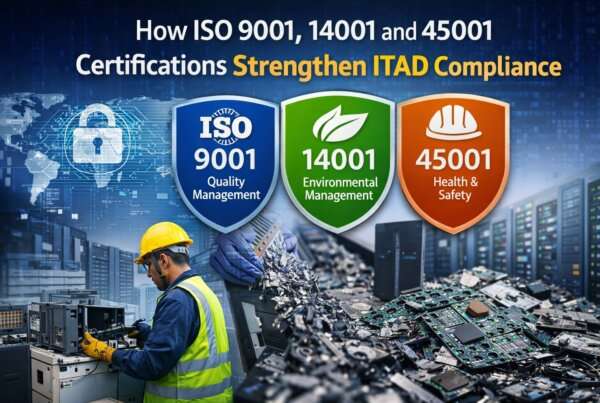Why Recycling Electronic Devices Safely Is Better Than Throwing Them Away
In our fast-paced digital world, technology evolves faster than most of us can keep up with. From smartphones and tablets to laptops, smartwatches, and televisions, new devices enter our lives almost yearly. With every upgrade, however, comes a difficult question: what do we do with the old devices?
For many people, the easiest solution is simply to toss outdated or broken electronics in the trash. Unfortunately, this choice has consequences that extend far beyond our households. The reality is that throwing away electronic devices contributes to one of the fastest-growing waste streams in the world—electronic waste (e-waste).
Recycling electronic devices safely isn’t just the more responsible option—it’s the smarter one. Below, we’ll explore why recycling electronics is better than throwing them away, the benefits it brings to the environment, human health, and even the economy, and how you can take part in the solution.
Understanding the Problem: What Is E-Waste?
Electronic waste, or e-waste, refers to discarded electrical and electronic devices. This includes obvious items like smartphones, laptops, TVs, and game consoles, but also everyday household items like microwaves, printers, routers, and even old cables.
According to the Global E-Waste Monitor, the world generated over 53 million metric tons of e-waste in 2019, and that number is projected to grow each year. Sadly, only a fraction of this waste is properly recycled—much of it ends up in landfills or incinerators, causing serious environmental and health issues.
Unlike regular trash, e-waste is filled with toxic substances such as lead, mercury, cadmium, and brominated flame retardants. When thrown away irresponsibly, these toxins can leach into the soil, air, and water, endangering ecosystems and human health.
The Hidden Value Inside Electronic Devices
It’s easy to think of an old phone or broken laptop as “junk,” but electronics are far from worthless. In fact, discarded devices often contain valuable raw materials. For example:
-
Gold, silver, and palladium are used in circuit boards.
-
Copper and aluminum are used in wiring and components.
-
Rare earth elements are essential for screens, batteries, and magnets.
The United Nations estimates that the raw materials inside e-waste are worth over $60 billion annually. By throwing devices into the trash, we are literally throwing away money and resources that could be reused. Recycling allows us to extract and repurpose these materials, reducing the need for destructive mining practices and conserving limited natural resources.
Environmental Benefits of Recycling Electronics
1. Reducing Toxic Pollution
When electronics are dumped in landfills, their toxic components don’t just disappear. Lead, mercury, and cadmium can seep into groundwater, pollute soil, and contaminate crops. Incinerating e-waste releases toxic fumes that harm both the atmosphere and human lungs. Recycling, on the other hand, prevents these pollutants from escaping into the environment.
2. Conserving Energy and Resources
Mining new metals and manufacturing new components consumes vast amounts of energy and water. Recycling recovers these materials and reduces the demand for mining, which not only conserves resources but also lowers greenhouse gas emissions. For instance, recycling one million laptops saves enough energy to power over 3,500 homes for a year.
3. Decreasing Landfill Waste
Landfills are already overcrowded, and e-waste takes up significant space. By recycling electronics, we reduce the burden on waste management systems and extend the lifespan of landfills, leaving more room for non-recyclable items.
Human Health Benefits of Recycling
The environmental hazards of e-waste directly translate into health risks for people. Improper disposal often leads to informal recycling practices in developing countries, where workers—sometimes children—dismantle electronics without protective gear.
Exposure to heavy metals and toxic chemicals from burning plastics or handling components can lead to respiratory illnesses, neurological damage, cancer, and reproductive health issues. Recycling electronics through certified facilities ensures that devices are dismantled safely, protecting both workers and nearby communities.
Economic Benefits of Safe Recycling
Job Creation
The recycling industry is a significant source of employment. From collection centers to refurbishing businesses, e-waste recycling creates jobs in logistics, engineering, repair, and environmental management.
Refurbished Market Growth
Not all discarded electronics are beyond use. Many can be repaired, refurbished, and resold at lower costs, making technology more accessible to people who might not afford brand-new devices. This extends the lifespan of products and strengthens the circular economy.
Reducing Economic Loss
As mentioned earlier, the raw materials in e-waste are extremely valuable. Safe recycling ensures these resources stay in circulation rather than being lost in landfills, reducing dependence on foreign imports for critical materials.
Recycling vs. Throwing Away: The Key Differences
| Throwing Away Electronics | Recycling Electronics |
|---|---|
| Toxic substances enter soil, water, and air. | Hazardous materials are safely removed and treated. |
| Valuable metals and plastics are lost forever. | Precious resources are recovered and reused. |
| Contributes to climate change via emissions. | Reduces greenhouse gas emissions by conserving energy. |
| Creates health risks for waste workers and communities. | Protects health by following safety standards. |
| No economic return. | Creates jobs and fuels secondary markets. |
The choice is clear: recycling benefits everyone, while throwing away only harms.
Common Myths About E-Waste Recycling
-
“Recycling is too complicated.”
In reality, many retailers and municipalities provide free drop-off points for electronics. Some manufacturers even offer mail-in recycling programs. -
“My device is worthless.”
Even if it’s broken, almost every electronic device contains recyclable materials. -
“Recycling isn’t secure for my data.”
Certified e-waste recyclers follow strict data destruction protocols to ensure your personal information is permanently erased before devices are dismantled. -
“Recycling doesn’t really make a difference.”
Recycling one cell phone saves enough energy to power a laptop for 40 hours. Small actions add up quickly when millions of people participate.
How to Recycle Your Electronics Safely
-
Check for Local Recycling Programs
Most cities have e-waste collection events or drop-off centers. Check your local government’s website. -
Use Manufacturer and Retail Programs
Companies like Apple, Dell, and Best Buy have take-back programs that accept old devices for recycling or trade-in. -
Donate or Sell Working Devices
If your device still works, consider donating it to schools, charities, or refurbishing organizations. -
Wipe Your Data First
Before recycling, back up your files and perform a factory reset. Remove SIM and memory cards as well. -
Choose Certified Recyclers
Look for recyclers certified by organizations such as R2 (Responsible Recycling) or e-Stewards, which guarantee ethical handling.
The Bigger Picture: Moving Toward a Circular Economy
Safe e-waste recycling is not just about managing trash—it’s about rethinking our entire approach to consumption. The circular economy model emphasizes keeping products and materials in use for as long as possible, minimizing waste and maximizing value.
By safely recycling electronics, we take a step toward this sustainable future, where technology supports human progress without compromising the planet.
Conclusion: The Smarter, Safer Choice
The convenience of throwing away old electronics is overshadowed by the long-term damage it causes to the environment, human health, and the economy. Recycling electronic devices safely isn’t just “better”—it’s essential.
By choosing to recycle, you:
-
Protect the environment from toxic pollution.
-
Conserve valuable natural resources.
-
Safeguard human health.
-
Support jobs and economic growth.
-
Contribute to a sustainable, circular economy.
The next time you upgrade your phone or replace a laptop, remember: tossing it in the trash isn’t the end of its story—it’s the beginning of a bigger problem. Recycling, on the other hand, gives that device a second life and ensures that the planet we pass on to future generations is cleaner, safer, and healthier.





